Many of you will have read articles in the press about the potential for singing to spread Covid-19. Research suggests that aerosols (miniscule particles of liquid generated by exhalation, which can linger in the air) are more prevalent in choral settings than other gatherings due to the breathing and projection required to sing well. For example, it is thought that aerosols emitted by infected singers spread the COVID-19 virus to numerous choir members in a few tragic rehearsals and concerts in the USA and Europe. Close and extended proximity of singers during these gatherings was also considered a factor. Much research on this issue is ongoing, some indicating that the non-singing factors in these choral situations (physical interaction and lack of ventilation) contributed significantly to those particular infection clusters. Due to the “lockdown”, choral rehearsals have largely stopped around the world, and the added fear of infection due simply to the act of singing has certainly taken its toll on our artform.
Australia (and Queensland in particular) is currently in an enviable position in the world in terms of control of the disease, and there is certainly more hope for choral activity to recommence here in some form, than there is in other places.
Much has been published expressing the artistic community’s perspective on the pandemic and its effects on singing on social media and online publications. Here are some interesting articles from areas of the world where the situation is much more severe:
John Rutter, Simon Halsey and Harry Christophers (UK) are among many eminent musicians who have published this open letter calling for leaders to find a way for choirs to sing again.
This interview with Lyn Williams from Gondwana Choirs and Brett Weymark from Sydney Philharmonia Choirs explores both problems and potential solutions from the Australian perspective.
Of course, the situation is daunting, but we here in Queensland are working on our plans to sing together safely as soon as we are able. For Brisbane Chorale, our procedures will include adhering to Government guidelines on gathering size, adhering to density rules (ie, the 4 sqm rule), positioning the singers with appropriate and generous physical spacing, and providing appropriate opportunities for hand and surface hygiene. Due to aerosol particle concern, excellent ventilation is an essential part of this scenario as well. So, finding a suitable venue is paramount.
To get started later in July (all being well) we’ll hold several weeks of rehearsals over the Zoom video conferencing platform. These will be live rehearsals with a small group of singers led by Emily, with other participating members remaining at home, joining the session via Zoom. This will provide a much-needed opportunity for our members to be in contact, leading to full gatherings later on. We’ve been heartened by the enthusiasm of our dedicated Brisbane Chorale members, who have indicated they are keen to get together and (safely) make choral music again.
As far as singing for an audience is concerned, we are researching how to best implement the guidelines for public gatherings. As restrictions lift, we are increasingly hopeful that we will be able to perform safely for you later in the year – hence, our rescheduled date for Brahms Requiem on 1 November. We’ll keep you posted on how it’s going – these are uncharted waters for all of us but we have faith in our wonderful Music Director and our whole team to work through the challenges ahead.






